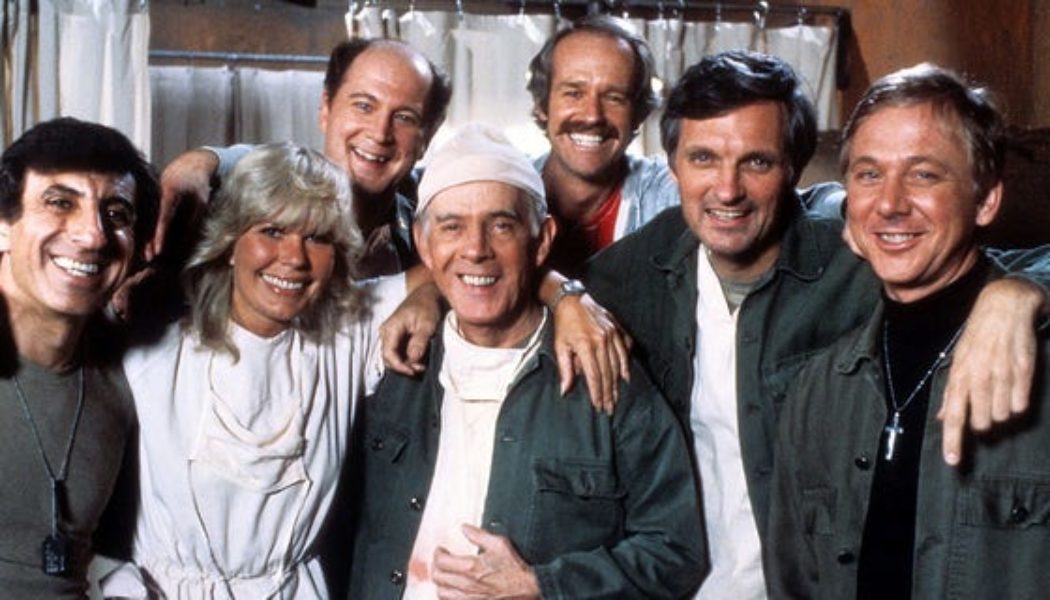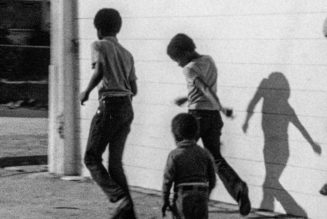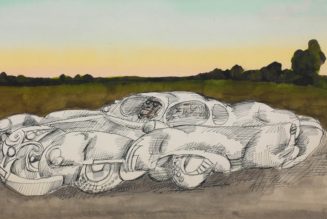More than 100 million Americans tuned in to bid “Goodbye, Farewell and Amen” to the doctors, nurses and staff of the fictional 4077th Mobile Army Surgical Hospital on this day in history, Feb. 28, 1983.
The final episode of the hit CBS sitcom “M*A*S*H” remained the most-watched television program in American history for 27 years.
It was finally surpassed by Super Bowl XLIV (the Saints over the Colts) in February 2010.
Its finale is still the most watched scripted TV show in American history, 40 years later.
ON THIS DAY IN HISTORY, FEB. 27, 1827, NEW ORLEANS CELEBRATES MARDI GRAS FOR FIRST TIME
“M*A*S*H” debuted in 1972, while the United States was still fighting the Vietnam War, sharing the dark, comedic antics within a field hospital set during the earlier Korean War.
“‘Goodbye, Farewell and Amen’ received a gargantuan 60.3 rating and 77 share … a whopping 105.9 million people watched on average over the two-and-a-half hours, with that number peaking at 121.6 million in the final six minutes,” writes MeTV.com in a 2022 retrospective of the landmark moment in American broadcast television.
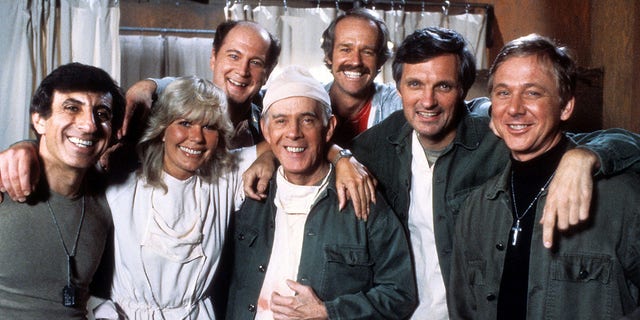
“M*A*S*H” sitcom actors, from left, Jamie Farr, Loretta Swit, David Ogden Stiers, Harry Morgan, Mike Farrell, Alan Alda and William Christopher in publicity portrait, circa 1978. (20th Century-Fox TV/Getty Images)
The 77 share meant that more than three-quarters of all the people watching TV that night were watching this one episode of “M*A*S*H.”
It drew a high-share of 82 in San Francisco, according to a report at the time from Variety.
“While the numbers are impressive, what makes ‘Goodbye, Farewell and Amen’ endure are the emotions.” — MeTV.com
“Advertisers, who spent up to $450,000 per 30-second commercial spot, apparently got their money’s worth,” Variety noted.
“M*A*S*H” was so popular during its 11-season run that Prince Charles visited a taping of the show while on a two-week tour of the United States in 1977.
He then joined a luncheon with the cast, still in costume, according to an Associated Press report at the time.
Added MeTV, “While the numbers are impressive, what makes ‘Goodbye, Farewell and Amen’ endure are the emotions. Simply put, the long ending stuck the landing.”
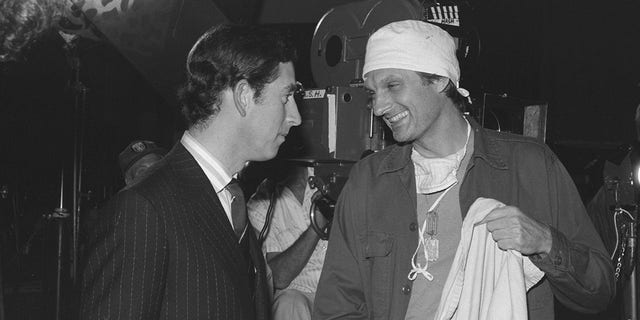
England’s Prince Charles talks with American actor Alan Alda, who played Capt. Benjamin Franklin “Hawkeye” Pierce on “M*A*S*H” during a visit to the set of the show, Oct. 27, 1977. This “M*A*S*H” episode, entitled “Comrades In Arms (part 1),” aired on Dec. 6, 1977. (CBS Photo Archive/Getty Images)
The episode closed with Hawkeye Pierce (Alan Alda) leaving the unit by helicopter, when he looks down and sees the word “Goodbye” in giant letters spelled out with rocks — the message left behind by fellow Army field surgeon B.J. Hunnicutt (Mike Farrell).
MEET THE AMERICAN WHO INVENTED THE TV REMOTE CONTROL: SELF-TAUGHT CHICAGO ENGINEER EUGENE POLLEY
It was in fact a “goodbye” to the nation from one of the most beloved casts in television history.
“Viewers laughed at the characters’ antics in Rosie’s bar or The Swamp with Hawkeye, nestled in his purple robe, the color of royalty,” the Hollywood Reporter wrote while celebrating the 35th anniversary of the finale in 2018.
“MASH” was at various times dark, deep, thoughtful, scathing or cynical — yet always riotously funny.
“They mourned losses in the operating room, sensed how tightly Radar (Gary Burghoff) clung to his Teddy bear at night, and felt Maxwell Klinger’s (Jamie Farr) pride in his Statue of Liberty outfit and B.J. Hunnicutt’s broken heart as he missed his daughter’s childhood.”
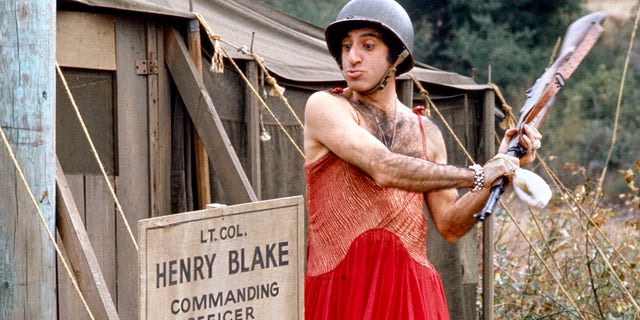
LOS ANGELES – JANUARY 1: Pictured is Jamie Farr (as Cpl. Maxwell Q. Klinger) on the CBS television sitcom, “M*A*S*H” in 1977. (CBS via Getty Images)
The audience that was glued to the tube for the final minutes was so massive it disrupted the plumbing infrastructure of New York City when the curtain closed.
“So many people rushed to the restroom after the ending, the subsequent pressure drop from flushing toilets caused a surge in the tunnels that bring water from the Catskills to New York,” wrote MeTV.
The sitcom was based on the hit 1970 movie “M*A*S*H,” which in turn was inspired by the 1968 book “M*A*S*H: A Novel of Three Army Doctors” by Richard Hooker, the pen name of a former military surgeon.
“M*A*S*H” the TV show was at various times dark, deep, thoughtful, scathing or cynical — yet always riotously funny.
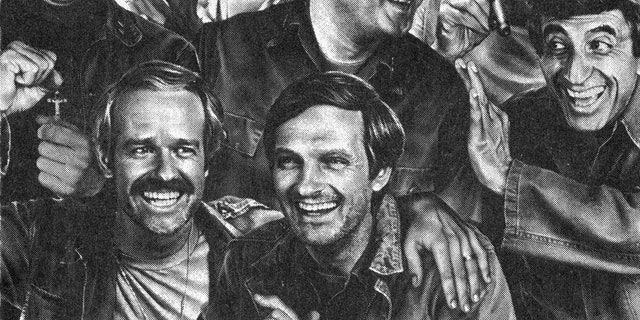
CBS Television advertisement as it appeared in the Feb. 26, 1983 issue of TV Guide magazine — an for the final episode of “M*A*S*H,” which was broadcast on Feb. 28, 1983. Featuring William Christopher, Mike Farrell, Loretta Swit, Alan Alda, David Ogden Stiers, Harry Morgan and Jamie Farr. (CBS via Getty Images)
Americans more than 40 years ago, millions of them veterans of World War II, Korea or Vietnam, related deeply to the struggles of the men and women of the 4077th.
Alda, who not only starred in “M*A*S*H” but helped script the final episode, was a U.S. Army veteran who actually served in South Korea shortly after the war there ended.
All of them were bound together by duty and common humanity, while lamenting the state of a species so quick to kill one another.
Farr, too, served in the Army in Korea around the same time.
“M*A*S*H” paired quick-witted doctors pulled from civilian life to patch up badly wounded and dying American boys, and sometimes the enemy, while skewering military regulation, thrown together with career Army regulars trying to maintain order.
CLICK HERE TO SIGN UP FOR OUR LIFESTYLE NEWSLETTER
All of them were bound together by duty and common humanity, while lamenting the state of a species so quick to kill one another.
“M*A*S*H” was, in its essence, divine anti-war comedy in the tradition of “Catch-22,” fed to a nation still patching up the physical and societal wounds of the Vietnam War.
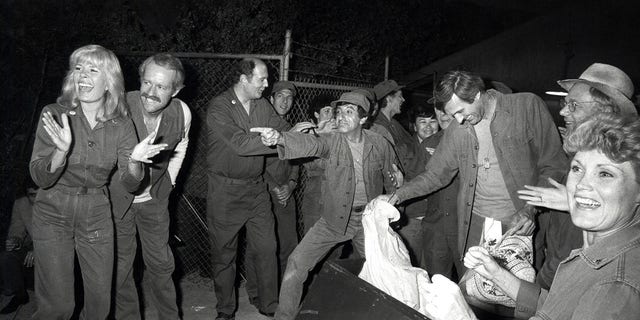
Press conference before final episode of “M*A*S*H” in February 1983. From left, Loretta Swit, Mike Farrell, David Odgen, Jaime Farr, Alan Alda, Harry Morgan, William Christopher and cast. (Ron Galella/Ron Galella Collection via Getty Images)
Its success was created by a unique confluence of circumstances: a cutting-edge, brilliantly written, well-acted emotionally captivating comedy that aired at the right moment in history.
CLICK HERE TO GET THE FOX NEWS APP
The proof of its connection was found in the historic size of the audience 40 years ago today.
“In building the landmark series, its cast and crew forged a bond of love and respect that lives to this day: a love for truth in storytelling, a love for the audience they were entertaining and a love for each other,” said the Hollywood Reporter.
